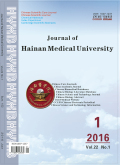- 钛学术文献服务平台 \
- 学术期刊 \
- 医药卫生期刊 \
- 大学学报期刊 \
- 海南医科大学学报(英文版)期刊 \
Effects of astragalus polysaccharides on ventricular remodeling and miRNA-21 in rats with acute myocardial infarction
Effects of astragalus polysaccharides on ventricular remodeling and miRNA-21 in rats with acute myocardial infarction
基本信息来源于合作网站,原文需代理用户跳转至来源网站获取
摘要:
Objective: To investigate the effect of Astragalus polysaccharides (APS) on myocardial remodeling and expression of miR-21 after myocardial infarction. Methods: Sixty SPF grade healthy male rats were divided into the sham operation group, the model group, astragalus polysaccharide low, medium and high dose groups and atorvastatin group randomly with 10 rats in each group. The left anterior descending coronary artery (LAD) was ligated to establish myocardial infarction model in rats, and the corresponding drug intervention was given for 4 weeks. The changes of myocardial morphology and collagen were observed by HE and Masson staining. The levels of IL-1β, IL-6, TNF-α and IL-10 were detected by ELISA. The mRNA expressions of miR-21, MMP2, TIMP-2, Col-I, and Col-Ⅲ was detected by RT-PCR. The protein expressions of TLR4, MyD88 and NF-κB p65 were detected by Western blot. Results: Compared with the model group, APS could improve the pathological morphology of myocardial tissue, increase the level of IL-10 in myocardial tissue, reduce the staining area of collagen and the contents of IL-1 β, IL-6 and TNF-α (P<0.05). At the same time, APS could decreased the expression of MMP2, Col-I and Col-Ⅲ mRNA and the ratio of MMP2/TIMP-2, and increased the expression of TIMP-2 mRNA and miR-21 significantly (P<0.05). Furthermore, APS could significantly reduce the expression of TLR4, p-NF-κB p65 and MyD88 protein in myocardial tissue of rats with myocardial infarction, and the differences were statistically significant when compared with the model group (P<0.05). Conclusion: APS can inhibit the activation of TLR4/MyD88/NF-κB signaling pathway by upregulating the expression of miR-21, which plays a therapeutic role in ventricular remodeling after acute myocardial infarction.

推荐文章
CASC2和miRNA-21在STEAMI病人急诊PCI前后外周血中的表达变化
急性ST段抬高型心肌梗死
经皮冠状动脉介入治疗
长链非编码RNA
微小RNA-21
癌易感性候选基因2
循环miRNA-21与肌钙蛋白T联合检测对急性心肌梗死早期诊断的应用价值
急性心肌梗死
miRNA-21
肌钙蛋白T
诊断
miRNA-21在糖尿病肾脏病的作用机制及中药干预新进展
糖尿病肾病
中药
miRNA-21
TGF-β1/Smads
PI3K/AKT
循环miRNA-21在急性冠脉综合征早期诊断中的表达水平及其临床意义研究
急性冠脉综合征
miRNA-21
急性胸痛
N末端脑钠肽前体
心肌肌钙蛋白
内容分析
关键词云
关键词热度
相关文献总数
(/次)
(/年)
文献信息
| 篇名 | Effects of astragalus polysaccharides on ventricular remodeling and miRNA-21 in rats with acute myocardial infarction | ||
| 来源期刊 | 海南医科大学学报(英文版) | 学科 | |
| 关键词 | |||
| 年,卷(期) | 2021,(8) | 所属期刊栏目 | Original article |
| 研究方向 | 页码范围 | 12-18 | |
| 页数 | 7页 | 分类号 | |
| 字数 | 语种 | 英文 | |
| DOI | |||
五维指标
引文网络
引文网络
二级参考文献 (58)
共引文献 (19)
参考文献 (8)
节点文献
引证文献 (0)
同被引文献 (0)
二级引证文献 (0)
2000(1)
- 参考文献(0)
- 二级参考文献(1)
2001(1)
- 参考文献(0)
- 二级参考文献(1)
2002(1)
- 参考文献(0)
- 二级参考文献(1)
2003(3)
- 参考文献(0)
- 二级参考文献(3)
2004(2)
- 参考文献(0)
- 二级参考文献(2)
2005(1)
- 参考文献(0)
- 二级参考文献(1)
2006(3)
- 参考文献(0)
- 二级参考文献(3)
2007(2)
- 参考文献(0)
- 二级参考文献(2)
2008(2)
- 参考文献(0)
- 二级参考文献(2)
2009(2)
- 参考文献(0)
- 二级参考文献(2)
2010(1)
- 参考文献(0)
- 二级参考文献(1)
2011(4)
- 参考文献(0)
- 二级参考文献(4)
2012(6)
- 参考文献(0)
- 二级参考文献(6)
2013(8)
- 参考文献(0)
- 二级参考文献(8)
2014(7)
- 参考文献(1)
- 二级参考文献(6)
2015(9)
- 参考文献(1)
- 二级参考文献(8)
2016(2)
- 参考文献(1)
- 二级参考文献(1)
2017(3)
- 参考文献(2)
- 二级参考文献(1)
2018(8)
- 参考文献(3)
- 二级参考文献(5)
2021(0)
- 参考文献(0)
- 二级参考文献(0)
- 引证文献(0)
- 二级引证文献(0)
引文网络交叉学科
相关学者/机构
期刊影响力
海南医科大学学报(英文版)
主办单位:
海南医学院杂志社
出版周期:
半月刊
ISSN:
1007-1237
CN:
开本:
出版地:
海南省海口市学院路3号
邮发代号:
创刊时间:
语种:
eng
出版文献量(篇)
3478
总下载数(次)
0
总被引数(次)
315
期刊文献
相关文献
推荐文献
- 期刊分类
- 期刊(年)
- 期刊(期)
- 期刊推荐
海南医科大学学报(英文版)2022
海南医科大学学报(英文版)2021
海南医科大学学报(英文版)2020
海南医科大学学报(英文版)2019
海南医科大学学报(英文版)2018
海南医科大学学报(英文版)2017
海南医科大学学报(英文版)2016
海南医科大学学报(英文版)2015
海南医科大学学报(英文版)2021年第9期
海南医科大学学报(英文版)2021年第8期
海南医科大学学报(英文版)2021年第7期
海南医科大学学报(英文版)2021年第6期
海南医科大学学报(英文版)2021年第5期
海南医科大学学报(英文版)2021年第4期
海南医科大学学报(英文版)2021年第3期
海南医科大学学报(英文版)2021年第24期
海南医科大学学报(英文版)2021年第23期
海南医科大学学报(英文版)2021年第22期
海南医科大学学报(英文版)2021年第2期
海南医科大学学报(英文版)2021年第17期
海南医科大学学报(英文版)2021年第16期
海南医科大学学报(英文版)2021年第15期
海南医科大学学报(英文版)2021年第14期
海南医科大学学报(英文版)2021年第13期
海南医科大学学报(英文版)2021年第12期
海南医科大学学报(英文版)2021年第11期
海南医科大学学报(英文版)2021年第10期
海南医科大学学报(英文版)2021年第1期

 免费查重
免费查重










